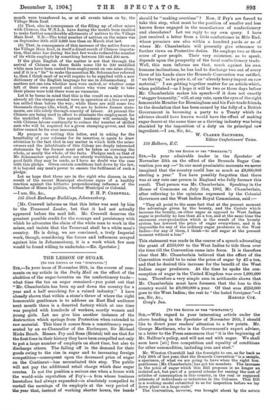SIB,—In your issue of November 26th, in the course of
com- ments on my article in the Daily Mail on the effect of the abolition of the sugar-bounties on the confectionery trade— what time the tax on sugar remained—you point out that "Mr. Chamberlain has been up and down the country for a year and a half searching for a ruined industry." I have already shown that within a stone's throw of where the right honourable gentleman is to address an East End audience next month there is a deserted factory which at one time was peopled with hundreds of workers, mostly women and young girls. Let me give him another instance of the destruction which springs from Protection when extended to raw material. This time it comes from a constituency repre- sented by an ex-Chancellor of the Exchequer, Sir Michael Hicks Beach. Messrs. Fry and Sons (Bristol) tell me that for the first time in their history they have been compelled not only to put a large number of employes on short time, but also to discharge others. The falling off in the demand for their goods owing to the rise in sugar and to increasing foreign competition—consequent upon the decreased price of sugar on the Continent—has necessitated this step. The public will not pay the additional retail charge which dear sugar creates. Is not the position a serious one when a house with the world-wide reputation of Fry's—a firm whose business heretofore had always expanded—is absolutely compelled to curtail the earnings of its employes at the very period of the year that, instead of working shorter hours, the hands should be "making overtime" ? Now, if Fry's are forced to take this step, what must be the position of smaller and less known firms engaged in the manufacture of confectionery and chocolates? Let me reply to my own query. I have just received a letter from a little confectioner in Mile End, whose premises are also within a hundred yards or so of where Mr. Chamberlain will presently give utterance to further views on Protective duties. He employs two or three score of poor people. Their very existence, so to speak, depends upon the prosperity of the local confectionery trade. Well, this man informs Ins that, much against his own humane inclinations, he has had to discharge two out of every three of his hands since the Brussels Convention was ratified, "on the top," as he puts it, of an " already heavy impost on raw material." I am getting together matter for an article which, when published—as I hope it will be two or three days before MI'. Chamberlain makes his speech—if it does not exactly "stagger humanity," will, at any rate, open the eyes of the right honourable Member for Birmingham and his Fair-trade friend* to the desolation that has been caused by the folly of a British Government in becoming a party to a Treaty which its advisers should have known would have the effect of making sugar dearer at the same time as a thriving industry was being shackled by the imposition of a duty on its principal raw ingredient. —I am, Sir, Stc.,
W. CLLRKE SAUNDERS, Editor Confectioners' Union.
150 Holborn, E.C.
(TO THE EDITOR OF THE "SPECTATOR."]






































































 Previous page
Previous page